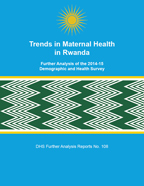
Abstract:
This report examines levels, trends, and
inequalities in maternal health in Rwanda
from 2010 to 2014-15 among women age 15-49
with a recent birth. The analysis uses
Demographic and Health Survey (DHS) data for
15 key indicators of maternal health: 6 for
antenatal care, 3 for delivery, 1 for
postnatal care, and 5 for barriers to
accessing medical care. Levels and trends in
these indicators were analyzed overall and by
three background characteristics: women’s
education, household wealth quintile, and
region. A further analysis of disparities by
wealth quintile was also performed, using the
concentration index. Overall, the results
show substantial improvements for 6 of the 9
key indicators of antenatal care, delivery
care, and postnatal care, as well as a
decrease in reported barriers to care.
However, a majority of women still receive
fewer than the recommended number of at least
four antenatal care visits, do not receive a
postnatal checkup within 2 days following
delivery, and report at least one serious
problem in obtaining health care. The study
also shows persistent disparities by
education, wealth, and region. In both
surveys, 11 of the 15 health indicators were
significantly unequal by women’s household
wealth status. Moreover, 8 indicators were
even more unequal by household wealth status
in 2014-15 than in 2010. Sometimes, gains can
occur faster among the wealthiest than the
poorest. Nevertheless, as maternal health
care improves in Rwanda, additional
initiatives and outreach should be directed
to disadvantaged groups and regions in order
to ensure better equity in maternal health.
